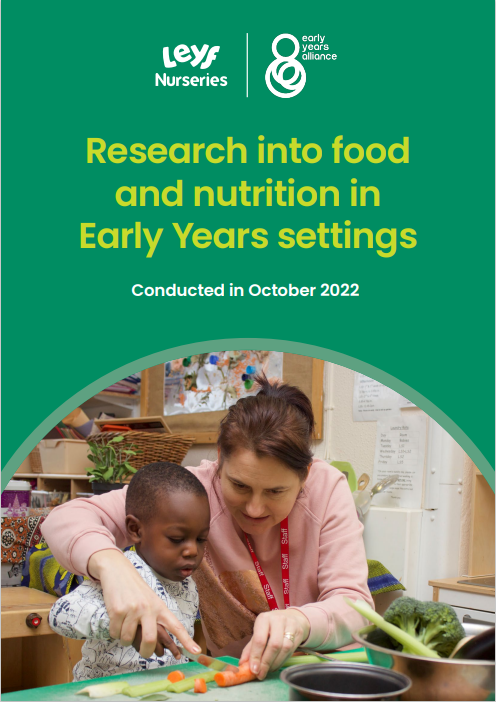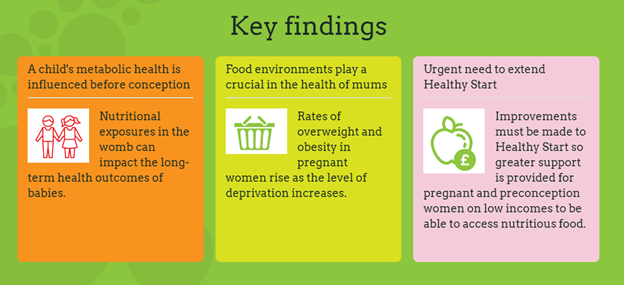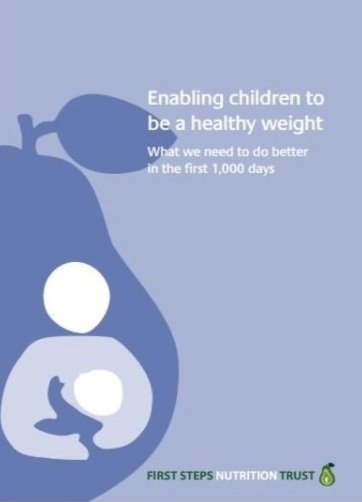Welcome to our February newsletter. We hope you are enjoying the slightly longer days and the first of the spring flowers.
Before we get on to news, we’d like to highlight that we have a surplus of our “Eating Well: Packed lunches for 1-4 year olds” (particularly useful for early years settings whose children eat packed lunches, to share with parents). If anyone is interested in purchasing at a reduced price please visit our shop, or if you would like to make us an offer for a bulk order please email admin@firststepsnutrition.org.
This month we share with you: news on ultra-processed foods; an overview of the Lancet 2023 breastfeeding series; results of a survey about food provision in Early Years settings; headlines from the Food Foundation’s new report on preconception, pregnancy and healthy weight in childhood; key points from the Government’s progress report on implementation of the ‘Best Start for Life’ vision; and lastly, headlines from our submission to the Health and Care Select Committee Prevention Inquiry.
In infant milk news we summarise the findings of a large cross sectional study exposing the issue of improper health and nutrition claims on infant milks in 15 countries, including the UK.
As secretariat of the BFLG-UK, we update you on what we know about the retained EU Law reforms bill, potential implications and what we’re doing about it.
For forthcoming events, the Food Policy Research Group at City will shortly be publishing a collaborative paper we co-authored, shining a light on the UK’s infant formula supply chain.
Lastly, we’re very sad to say that our administrator Sian is moving on to a full time job elsewhere, meaning our part time administrator role is open for applications NOW! Please share widely.
Happy reading.
News
Mounting concern over Ultra-Processed Foods
This month, the Soil Association launched #TakingTheBiscuit, a campaign calling on the Government to take action on ultra-processed food (UPF). The campaign builds on the Soil Association’s latest Taking the Biscuit report, which outlines how the UK government is promoting UPF to families, despite evidence that they present risks to health.
UPFs are the foods and drinks which fall in to the fourth category in the NOVA classification of commercially-available products, created by the Brazilian academic Carlos Monteiro (Monteiro C et al, 2019). This classification groups foods according to the extent to which they have been industrially processed, and defines ultra-processed foods as “formulations of ingredients made by a series of industrial processes”.
UPFs are ubiquitous and heavily marketed, including in the baby food aisle (Grammatakaki et al, 2021). This is reflected in the diets of young children, with 61% of total energy intake in children aged 2-5 years of age coming from UPF (Neri D et al, 2021). This data was recently highlighted in this Telegraph article: 'British toddlers' diet among worst in world, experts warn', written following our presentation of this data at the Unicef Baby Friendly Initiative conference last November in our talk “UPFs in the diets of infants and young children in the UK”.
As the Soil Association summarises in their Taking the Biscuit report, a growing body of research now links high intakes of UPFs with negative health outcomes, including in children. This has prompted governments around the world to recognise and start taking action to reduce UPF consumption. However, the UK Government is not only failing to acknowledge the issue of UPFs but promoting their use through the NHS Food Scanner App, with worrying nutrition and health implications for infants and young children.
More information about the campaign can be found here, including a link to sign their petition. We support their calls for the UK government to revise guidance on healthy eating to reflect the latest evidence, and to take action to reduce the contribution of UPFs to average diets.
First Steps Nutrition also welcome news that the Scientific Advisory Committee on Nutrition is carrying out a “scoping review of the evidence on processed foods and health”, and we look forward to seeing their position statement on this issue when it is published in the summer.
Launch of the Lancet Breastfeeding Series 2023
On the 8th of February the much-awaited Lancet Breastfeeding Series 2023 was launched at a hybrid event in London. The launch recording is available to watch for those who missed it. A key message from the launch event was clear: marketing by commercial milk formula companies has no boundaries and company profits come before health and rights. This marketing needs to be controlled to protect breastfeeding and ensure that all parents/carers and health care professionals can make informed decisions about infant feeding which are not unduly influenced by commercial pressure.
The three papers in the series provide up-to-date reviews of the most recent evidence on breastfeeding and on commercial formula marketing, together with many recommendations on how this marketing can be curbed.
Paper 1: Breastfeeding: crucially important, but increasingly challenged in a market-driven world.
This paper documents how common baby behaviours, such as waking and crying, are often used to undermine breastfeeding by implying that there could be a formula solution. It provides many examples of policy and programmatic actions that could be implemented to create an enabling environment that would support mothers wanting to breastfeed.
Paper 2: Marketing of commercial milk formula: a system to capture parents, communities, science, and policy.
This paper illustrates the various routes and strategies whereby commercial milk formula companies actively and deliberately target parents, health professionals and politicians. It concludes with a strong statement that “Fact-based information on feeding infants and young children that is free from commercial influence is a human right that must be available to all.”
Paper 3: The political economy of infant and young child feeding: confronting corporate power, overcoming structural barriers, and accelerating progress.
This paper shows how power imbalances and political and economic structures determine feeding practices and presents a framework for investigating the political economy of infant and young child feeding. It suggests six high-level recommendations that extend beyond the issue of breastfeeding and the health sector to include societal, political, and economic reforms.
The findings from paper 2 are particularly relevant to First Steps, given our role providing conflict of interest-free information on infant milks marketed in the UK, and our focus on maintaining and promoting our Eating Well resources. We will also continue, through our role as secretariat for the Baby Feeding Law Group-UK, to promote better regulation of the marketing of commercial milk formula and other baby feeding products through advocating for alignment of UK laws with the International Code of the Marketing of Breastmilk Substitutes, including all subsequent relevant WHA resolutions. Meaningful enforcement of the relevant laws also remains an important priority of the BFLG-UK.
Following the Lancet launch, Alison Thewliss, MP, chair of the All Party Parliamentary Group on Infant Feeding and Inequalities secured an Adjournment Debate on Government support for breastfeeding and the 2023 Lancet Series, which took place on the 20th of February. You can watch the debate here (from time 20:08:30 until 20:30:50) and the full transcript of the debate is available here. Alison provided an accurate summary of the most pertinent findings and recommendations from the Lancet Breastfeeding Series 2023 and the implications for the UK, including the role the UK Government needs to play in stopping the aggressive marketing by the commercial formula milk industry.
Results of a survey on food provision in Early Years settings
The Early Years Alliance and London Early Years Foundation (LEYF) conducted a joint survey in October 2022 to better understand how the early years sector is coping with increased food prices and how they can best be supported. Results of the survey were recently published here, to support the launch of the #EarlyNutritionMatters campaign, which calls for additional Government early years funding to ensure that all young children have access to healthy and nutritious food.
The survey captured experiences and opinions from 500 settings, representative of the early years sector across England. 94% reported being negatively impacted by rising costs, rooted in systematic early years funding shortages. Despite settings finding creative ways to stretch their budgets, including using seasonal foods, reducing meat consumption and making use of deals and offers in the supermarkets, 62% still reported needing to use cheaper ingredients, 15% needing to reduce portion sizes and 7% needing to reduce the number of meals or snacks offered. This has worrying implications for young children, who require appropriate quantities of nutrient-rich foods for optimal growth, health and development.
In the current context, where 25.8% of households with children were food insecure (Food Foundation, 2022), Early Years settings have a crucial role in protecting the nutritional status of young children through the provision of nutritious snacks and meals. However, survey results show that many settings felt compromised in their ability to do this, and revealed concerns that the most vulnerable children are often disproportionately affected. Despite doing their best to cope with increasing food prices, two-thirds of settings felt required to ask families with funded-only children to pay top-up fees to cover the cost of food.
These findings, alongside data on increased levels of food insecurity among UK households, highlight the need for additional early years funding specifically to cover the cost of meals and snacks in early years settings. This is especially true for children from 4 years of age attending Early Years settings whose families were eligible for Healthy Start, but only until they turned 4.
The Early Years Alliance and LEYF are jointly calling on the Government to ensure that all young children have access to healthy and nutritious food as part of their #EarlyYearsMatters campaign. You can support this by posting on social media using the #EarlyNutritionMatters hashtag, tagging the Department for Education (@educationgovuk).
First Steps Nutrition Trust support this ask and continue to advocate to the Government to make early years food standards mandatory in order to safeguard access for infants and young children to an appropriately nutritious diet.
New report: Preconception, Pregnancy and Healthy Weight in Childhood
This report from the Food Foundation is the first to be published in what will be a series that will progress, stage-by-stage, through a child’s early years, building on our 2021 report “Enabling Children to be a healthy weight: What we need to do better in the first 1000 days”. The series will explore the underlying systemic failures in the food system that lead to the high levels of child overweight or obesity by the start of primary school and will make recommendations to policy makers and businesses to enable the consumption of a healthy diet during the early years.
In this first report, the Food Foundation argues that greater support is needed to support low-income women of child-bearing age and expectant parents during pregnancy to eat well. It highlights how policies targeting preconception and pregnancy are largely absent from Government strategies to improve diet-related health, yet this is the crucial time point to lay foundations for a child’s healthy growth trajectory – which, in turn, impacts adult health and future generations.
Government publishes ‘Best Start for Life’ vision progress report
On February the 9th, the Departments for Education and Health and Social Care released a progress report on the delivery of the Best Start for Life vision as outlined in the March 2021 policy paper: ‘Best Start for Life: a vision for the critical 1,001 days’. Key to this vision is the creation of ‘Family Hubs’, which are meant to be one stop shops to provide families help and support with a wide range of issues such as infant feeding, mental health and relationship building as well as bringing together wider wraparound services such as advice on getting into work.
The report lists the following achievements to date:
• The announcement in autumn 2021 of over £300 million to fund a 3-year Family Hubs and Start for Life programme in 75 local authorities in England;
• Appointment of 14 local authorities as ‘trailblazers’;
• Planned investment of £10 million between April 2023 and March 2025 in Start for Life workforce pilots in approximately 5 areas;
• Planned investment of £12 million in a separate Family Hubs Transformation Fund to support an additional 12 local authorities across England to move to a family hub model by March 2024;
• Setting up an evaluation of the Family Hubs and Start for Life programme investments;
• Publishing guidance for local authorities to provide a universal Start for Life offer.
The progress report goes on to highlight that the 3 priorities in the coming months are:
1. To ensure the Family Hubs and Start for Life programme delivers rapid, visible support for families
2. To develop a digital version of the personal child health record
3. To develop a Start for Life outcomes framework, review the regulatory framework for children’s health services and ensure there is a proportionate and effective inspection regime.
Prevention in health and social care: Health and Care Select Committee inquiry launched
We made a submission in to this inquiry, which will involve a two stage process. The first stage will inform the Committee’s focus in subsequent stages, when they will invite submission of more evidence on chosen topics.
Read our submission here.
Our submission is based on our 2021 report “Enabling Children to be a healthy weight: What we need to do better in the first 1000 days”. We highlight that the lack of necessary attention to the specific nutritional needs and vulnerabilities of infants, young children and their mothers is leading to preventable ill health. A key indicator is persistently high rates of childhood obesity, which will only be brought down if preventive efforts include sufficient action in the first 1,000 days, from pregnancy to age 2. We urge the committee to include in the inquiry a focus on the adequacy and coherence of Government interventions intended to meet the target of halving childhood obesity by 2030.
Infant Milk News
There are no new or discontinued infant milks to report this month, but we have have refreshed the product data on our website infantmilkinfo.org to reflect the formulation, availability and cost of infant milks on the UK market as of January 2023.
New study: Health and nutrition claims for infant formula: international cross-sectional survey
This paper published by Cheung and colleagues in the BMJ on the 15th February reviewed and evaluated health and nutrition claims for infant formula, follow-on formula and specialised infant milks for the dietary management of cows’ milk allergy on official formula company owned or managed public and health care professional (HCP) facing websites in 15 countries including the UK. Where claims were supported by evidence from clinical trials, the evidence used was formally evaluated for risk of bias using proprietary tools.
Across 757 products a total of 1884 claims were identified, the majority relating to ingredients. The most common claim types were “helps/supports development of brain and/or eyes and/or nervous system”, “strengthens/supports a healthy immune system”, and “helps/supports growth and development”. The most common ingredients used in claims were long chain polyunsaturated fatty acids. Only 26% of products with more than one claim provided a supporting scientific reference. The reference types most frequently used were clinical trials, of which only 26% were registered, and reviews. An astonishing 90% of claims referenced registered clinical trial outcomes at high risk of bias, and all cited systematic reviews and pooled analyses carried a high risk of bias. The authors noted ‘a high level of redundancy in relationships between claims and ingredients and little scientific substantiation of claims’ which exposes their role as vehicles for marketing.
This important work considerably strengthens existing evidence of inappropriate marketing of commercial milk formulas. It emphasizes the need for better regulation and monitoring of claims to protect babies and their parents from commercial interests, which would ideally be achieved by prohibiting the marketing of all breastmilk substitutes through enforced legislation which at least matches the WHO Code and resolutions.
You can read the full paper by Cheung et al, here.
Other investigations both globally and in the UK have found that commercial milk formula companies fail to comply with the Code. You can access some of these on the BFLG website. We have reviewed health and nutrition claims for infant milks which have appeared in healthcare professional facing journals in our report Claims made for infant formula ingredients and formulations; and in our reports “Scientific and factual?” A review of infant formula advertising to healthcare professionals and “Scientific and factual?” A further review of infant formula advertising to healthcare professionals.
More information on UK regulations around the marketing of infant milks is available on the BFLG website here.
For infant milk information please visit our dedicated website: www.infantmilkinfo.org. If you can’t find what you’re looking for please email Susan@firststepsnutrition.org
Baby Feeding Law Group UK news
Retained EU Law reforms bill: what we know so far and potential implications
On 22 September 2022 the Retained EU Law (Revocation and Reform) Bill was introduced to Parliament. The intention of the Bill is to end the special status of retained EU law in the UK by 31 December 2023, by allowing Government to more easily, repeal and replace (or retain) retained EU Law. The Bill will also include a sunset date (which may be extended for specified pieces of retained EU Law until 2026) by which all remaining retained EU Law will either be repealed or assimilated into UK domestic law. The Bill had a second reading and general debate on 6 February 2023, and a line-by-line examination of the Bill began on 23 February 2023.
Like many others we are concerned that this Bill introduces the possibility for laws to be repealed or revoked. There are many laws that fall within the remit of the Department of Health and Social Care which aim to ensure that the foods we eat are safe and comply with composition, labelling and marketing requirements. We are engaging in targeted advocacy with relevant key stakeholders to highlight that the current laws relating to the composition, labelling, and marketing of formula and foods for infants and young children need to be retained as they represent the minimum legal requirements to protect infant and young child health.
APPG on Infant Feeding and Inequalities Meeting: Tuesday 14th March
The All-Party Parliamentary Group on Infant Feeding and Inequalities will be hosting a hybrid meeting on the 14th of March from 1-3pm. If you are interested in attending this meeting you can sign up for updates and the Zoom link via this form and visit the APPG website. If you wish to attend the upcoming meeting in-person spaces are limited and first come first served, and you will need to email Alison.thewliss.mp@parliament.uk.
You can follow the work of the Baby Feeding Law Group on twitter @BflgUK and at www.bflg-uk.org.
For questions about the BFLG-UK please contact Katie at katie@firststepsnutrition.org
Forthcoming
‘Policy insight’ on infant food insecurity and the UK’s formula supply chain
Watch out for this policy piece written by Dr Vicky Sibson and Naomi Fallon for the Food Research Collaboration at City University, outlining what infant food security means in the UK and why we’re concerned about it. In short, a combination of the UK’s formula feeding culture and highly concentrated infant formula supply chain renders British babies highly food insecure, particularly in the event of a significant emergency. We make seven recommendations to better safeguard the food security of the nation’s infants. We will summarise this report in the March newsletter, and in the meantime will share via Twitter as soon as it has been published.
HR Update
Goodbye Siân!
Sadly our administrator Siân is leaving for a full time job elsewhere. This means we are currently recruiting for a new part-time (2 days a week) administrator to join us, playing a critical role in supporting our small team.
The role involves managing our financial accounts, administration and communications. A full job description and how to apply can be found here.
Do you know someone who has relevant experience and is looking for a new role?
Please share widely to help us find the ideal candidate.


















